28 August 2006
Sovereign Grace Baptist Church
It was encouraging to worship at the church in the nearby village of Blackie and to hear quotations from Robert Murray M'Cheyne, allusions to John Piper's Future Grace, and circumspect exposition of 1 Peter.
I have a long affinity for the church in this rural village since it was the congregation that I joined when I was brought to Christ in the late winter of 1992. It was also the congregation where I functioned as pastor during an internship through Prairie Bible College in 1995.
The church has seen many pastors over the years. Among them was my good friend Ryan Fullerton who now pastors Immanuel Baptist, a vibrant church serving Southern Seminary, Boyce College and inner-city Louisville, KY.
The church at Blackie has had many trials as well. But now to hear the glorious truths of Scripture heralded by pastor Todd Brae with compassion and God-ward perspective is a blessing to my heart.
It is fitting that the church has changed its name to correspond to its emphasis. And so I am happy to commend their new website of the same name:
Sovereign Grace Baptist Church
I have a long affinity for the church in this rural village since it was the congregation that I joined when I was brought to Christ in the late winter of 1992. It was also the congregation where I functioned as pastor during an internship through Prairie Bible College in 1995.
The church has seen many pastors over the years. Among them was my good friend Ryan Fullerton who now pastors Immanuel Baptist, a vibrant church serving Southern Seminary, Boyce College and inner-city Louisville, KY.
The church at Blackie has had many trials as well. But now to hear the glorious truths of Scripture heralded by pastor Todd Brae with compassion and God-ward perspective is a blessing to my heart.
It is fitting that the church has changed its name to correspond to its emphasis. And so I am happy to commend their new website of the same name:
Sovereign Grace Baptist Church
25 August 2006
Love and First Impressions
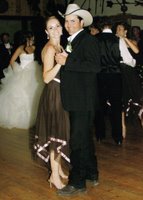 The story was told at our wedding about the first time I laid eyes on Clint. I was new to the community and totally naive of western culture. He caught my attention as he sauntered into the church dressed head to toe in his cowboy glory, ruggedly handsome with his broad shoulders and muscular frame. As the story goes, I turned to my new girlfriends and asked, "Is that how people dress around here?" (The size of his belt buckle really blew me away.)
The story was told at our wedding about the first time I laid eyes on Clint. I was new to the community and totally naive of western culture. He caught my attention as he sauntered into the church dressed head to toe in his cowboy glory, ruggedly handsome with his broad shoulders and muscular frame. As the story goes, I turned to my new girlfriends and asked, "Is that how people dress around here?" (The size of his belt buckle really blew me away.)I have been reading through C. H. Spurgeon's Autobiography, and have come to the chapter entitled "Love, Courtship, and Marriage" written by Mrs. C.H. Spurgeon. She writes a humorous account of the first time she saw her husband (causing me to recollect my first sighting of my beloved husband.)
The first time I saw my future husband, he occupied the pulpit of New Park Street Chapel...if the whole truth be told, I was not at all fascinated by the young orator's eloquence, while his countrified manner and speech excited more regret than reverence. Alas, for my vain and foolish heart! I was not spiritually-minded enough to understand his earnest presentation of the gospel, and his powerful pleading with sinners, but the huge black satin stock, the long, badly-trimmed hair, and the blue pocket-handkerchief with white spots which he himself has so graphically described--these attracted most of my attention, and, I fear, awakened some feelings of amusement. There was only one sentence of the whole sermon which I carried away with me, and that solely on account of its quaintness, for it seemed to me an extraordinary thing for the preacher to speak of the "living stones in the Heavenly Temple perfectly joined together with the vermilion cement of Christ's blood." (p. 280-281)She obviously loved her husband very much. She describes the garden where Spurgeon purposed to her:
This chapter is a must read for all romantics. And thank God for this godly woman who speaks so highly of her marriage! It can be discouraging to hear older women tell us younger women over and over what a hardship marriage is. It is sad to see how worldly thinking has penetrated the church. It seems that women find more enjoyment from putting their husbands down in public than from praising them. And if someone dares to praise her husband it almost assuredly followed by a condescending remark by another women saying, "Oh, you're still in the honeymoon stage. You'll find out later."I think of that old garden as a sacred place, a paradise of happiness, since there my beloved sought me for his very own, and told me how much he loved me. Though I thought I knew this already, it was a very different matter to hear him say it, and I trembled and was silent for very joy and gladness...thank God, throughout all my blessed married life, the perfect love which drew us together never slackened or faltered, and , though I can now see how undeserving I was to be the life companion of so eminent a servant of God, I know he did not think this, but looked upon his wife as God's best earthly gift to him.
In the diary I then kept, I find this brief but joyful entry: "August 2, 1854.--it is impossible to write down all that occurred this morning. I can only adore in silence the mercy of my God, and praise Him for His benefits." (p. 284)
For some reason women find it a real bonding time to complain about their husband and marriage, and it is decidedly out of style to speak highly of their man. But what kind of effect does that have on people's marriages?
I am challenged to be praising and thanking God daily for his great benevolence to me. May I never become presumptuous on God's goodness, but rather properly appreciate the delightful gift He has given me (belt buckle and all.)
Interest in the Young, Restless and Reformed
24 August 2006
More Calamities
The Presbyterian Church (USA) has published a book accusing the Bush administration of being behind the 9/11 attacks. Mark D. Roberts a pastor in the denomination (and blogger) has responded with criticism of his denomination:
Paul Martin also gave his thoughts on the vacuity of liberal mainline churches from his experience of a Sunday service:
I truly believe that lapsed Christianity creates monsters. Liberalism doesn't build, but rather destroys.
As Spurgeon said concerning liberals:
I wonder when my congregation will say, "Enough is enough. Why do we continue to be part of a denomination that consistently does things that are so obviously divisive and unwise, if not offensive to us? When does the cost of being part of the PCUSA overwhelm the dwindling benefits?" As a pastor, I wonder how much longer I want to keep putting out denominationally-set fires in an effort to protect my church from burning down.(HT: Hugh Hewitt)
Paul Martin also gave his thoughts on the vacuity of liberal mainline churches from his experience of a Sunday service:
Which takes me to my point – mainline denominations like the PCC are dead and this is why: God is not there. End of story.
God will not come down to a place where His supremacy is denied, His Word is mishandled, His Name is mocked, His presence is not sought, His holiness is forgotten, His Son is ignored, His created gender distinctions are not honoured, His Gospel is not preached, and His reality is considered trivial. That is what you get in mainline churches and that is why they are dead.
I truly believe that lapsed Christianity creates monsters. Liberalism doesn't build, but rather destroys.
As Spurgeon said concerning liberals:
All that they can do now is to wriggle into our churches, and hiss from pulpits which were once filled by the orthodox. They cannot build places of worship of their own,—they could not build a mousetrap; as a rule, there is not power enough in their teaching to gather a congregation, or to keep one when it is gathered. All the vitality, force, and energy they possess are spent, cuckoo-like, in laying their eggs in the nests which we take the trouble to fashion, for they cannot build their own.
23 August 2006
A Great Spiritual Calamity in the Church History of Canada
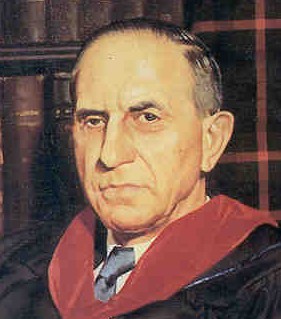
In an address given to the alumni of Westminster Theological Seminary, John Murray noted the theological compromise that had plagued Trans-Atlantic Christianity in the early 20th century. Among his examples was a Canadian one:
In that same year, 1925, a great spiritual calamity occurred in the church history of Canada. It was in that year that the union of the Methodist, Congregational and Presbyterian churches was consummated. By this union a large proportion of the Presbyterian Church in Canada abandoned the historic Presbyterian witness and entered into a communion that had as its basis a confession acceptable to the overwhelming majority of Methodists and Congregationalists in that Dominion.
~The Banner of Westminster Seminary in The Claims of Truth, Collected Writings of John Murray Vol. 1 (Banner of Truth), p.100.
The warning for our own day is that such calamities can happen, though they are not percieved as such when they occur.
Let us not be complacent, but hold to the ethos of the Psalmist: "Thou hast given a banner to them that fear thee, that it may be displayed because of the truth" (Psalm 60:4)
Canadian Bloggers
Some excellent Canadian bloggers I've been looking at recently (that is, other than the great folks in Southern Ontario!) are:
A Reformed gal from Whitehorse who likes David Brainerd and gardening. Concise and Interesting.
Daniel in Winnipeg who thinks marketing the church equals selling out. Earnest and Earthy.
A Reformed gal from Whitehorse who likes David Brainerd and gardening. Concise and Interesting.
Daniel in Winnipeg who thinks marketing the church equals selling out. Earnest and Earthy.
21 August 2006
Are You Young, Restless and Reformed?
The upcoming cover of Christianity Today looks like this:
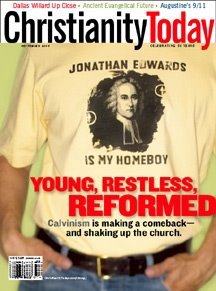
The question is, how will CT portray the Calvinistic renewal that many of us have witnessed first-hand?
And is cool Calvinism (see the shirt) a sign of advance or decline in this renewal?
My early thoughts on this resurgence of Calvinistic belief and practice in the 20th century were set down in an essay titled, Breaking Fallow Ground: The Rise of Neo-Puritanism in the 20th Century (formerly hosted at the Tanglewood Baptist Church website, but now seemingly no more).
Here is the opening paragraph:
(HT: Jonathan Edwards Center Blog)
UPDATE: Justin Taylor has posted about the CT cover at the Reformation21 blog, but will post on his own blog later when the CT issue comes out.

The question is, how will CT portray the Calvinistic renewal that many of us have witnessed first-hand?
And is cool Calvinism (see the shirt) a sign of advance or decline in this renewal?
My early thoughts on this resurgence of Calvinistic belief and practice in the 20th century were set down in an essay titled, Breaking Fallow Ground: The Rise of Neo-Puritanism in the 20th Century (formerly hosted at the Tanglewood Baptist Church website, but now seemingly no more).
Here is the opening paragraph:
I have come to consider the term Neo-Puritanism to be too restrictive, but at the time that I wrote the essay it seemed to fit.
Hard soil sprouts no fruit. In the farmer’s world, this truth spurs him to till his acres and break up the fallow ground. Likewise for the Christian, he must cultivate the rocky terrain of his heart, turning over the crust of decay and plowing up the nutrients of older, deeper times. In the shifting seasons of history, Christianity has been in a cycle of birth, growth, decay, and rebirth. As with all of God’s creation, there have been times to plant new seed amid the compost of rotting residue. Such a time came at the mid-point of the 20th century when a new planting occurred through a renewed interest in the Reformers, Puritans and the preachers of revival. This movement served to bring life to a parched Christian landscape, and has been characterized as a type of pietistic Calvinism, nicknamed, “Neo-Puritanism”.
(HT: Jonathan Edwards Center Blog)
UPDATE: Justin Taylor has posted about the CT cover at the Reformation21 blog, but will post on his own blog later when the CT issue comes out.
Jam and Books

New Lumps' wife, Juanita, has started a blog, and it looks like it is going to be a good one! I am always appreciative when wise and godly people take the time to blog so that the rest of us can glean from them.
Harvest

As young men and women head off to colleges, I know that it is harvest-time.
The fields are golden and the skies are blue. Judgement time begins in earnest today when the grain will be separated from the chaff. It is a time of closure, finality and intended destination. Although I wish I could be teaching this fall, I'm glad to be bringing in the harvest. I learn so much from it.
20 August 2006
Proximity
Doesn't there seem to be a pretty important theme in Scripture concerning the proximity of God? Think for a moment:
A great deal of misunderstanding, both in expectations and reflections, comes from confusion about the proximity of God in his unfolding revelation.
Is not our lack of faith and struggles with unbelief in part due to our craving for God's proximity on our terms rather than His? But our flesh desires to control God, or be God. Thankfully the Spirit of Christ teaches us otherwise.
- presence/ absence
- incarnation/ resurrection/glorification
- seen/unseen
- temple-holy of holies/ temple of Holy Spirit-church in the world
A great deal of misunderstanding, both in expectations and reflections, comes from confusion about the proximity of God in his unfolding revelation.
Is not our lack of faith and struggles with unbelief in part due to our craving for God's proximity on our terms rather than His? But our flesh desires to control God, or be God. Thankfully the Spirit of Christ teaches us otherwise.
19 August 2006
Discovering Italian Reformers #2
Jesus Christ says that no man comes to Him unless His Father draws him (John 6:44). The apostle Paul says also, " All have not faith" (2 Thessalonians 3:2) and "faith is the gift of God" (Eph. 2:8). From this I understand that it is not a man's power to believe, to love, and to confide. Nor is it in the power of man to know God or to know himself. All of this is only brought about by the distinct favor of God. For it is beyond a man's power to make himself inwardly pious, just, and holy, since it is only God that is able to effect all of this.
~ Juan De Valdes (d. 1541) in the Eighteenth of One Hundred and Ten Considerations, Because of Christ, James M. Houston ed. (Victor, 2005), p.56.
Some will call such a statement Calvinistic, yet is nothing more than sound biblical teaching with or without the label.
17 August 2006
M'Cheyne's Impact
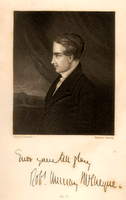
The impact of Robert Murray M'Cheyne's life continues to be felt. Now on-line, his bible reading plan is available in English Standard Version--to be read or listened to!
Anyone who knows me knows that M'Cheyne is a hero of mine. Three words: Scots, Holy, Revival. 'Nuff Said.
If you are interested in learning about M'Cheyne on-line, check out David Haslam's long-running and extensive collection of data at his Robert Murray M'Cheyne website, here.
One of my older articles is published on the M'Cheyne site titled, Of Common Ilk: Spiritual Friendship as a Means of Grace in the Lives of Robert Murray M'Cheyne and His Companions.
15 August 2006
Schreiner on Biblical Women's Ministries
Here is the pdf file from Tom Schreiner outlining many women's ministries in the church. Schreiner says:
...contemporary women should be encouraged by the women in the Scriptures
who have contributed to the spread of God’s kingdom message. God does not use men
alone to accomplish His purposes. Both sexes are created in God’s image, and both men
and women have been used mightily by God. No woman who has a desire to please God
should feel that there is no place for her ministry in the church.
Kostenberger on Biblical Headship
His post is here at Biblical Foundations.
14 August 2006
Discovering Italian Reformers #1
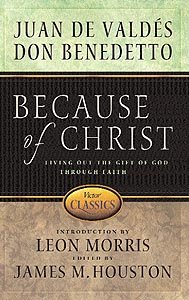
I picked up a Victor Classics book in the series edited by James Houston titled, Because of Christ: Living Out the Gift of God Through Faith. It is an abridged and edited work combining two treatises from Italian theologians in the 16th century.
The first work is One Hundred and Ten Considerations by Juan de Valdes (d. 1541). It is essentially a treatise on justification by faith alone, and the practical implications of this truth. What is remarkable about Valdes' thought is that, as James Houston argues:
there is no evidence he or his circle of friends were in touch with the Reformation sources of Luther, Calvin or other works in the 1530's. Yet later at the trial of Valdes' friend Cardinal Carnesecchi before the Inquisition, the Inquisition judge saw no distinction between Lutheranism and Valdes' teaching.
I will post again from some of the insights of Juan de Valdes, as well as the second treatise On the Benefit of Jesus Christ, Crucified by Don Benedetto.
Martyn Lloyd-Jones on Monday
13 August 2006
Trying Exams, an Aleatoric Chorus and Excellent Preaching
It's been a tiring week. I just finished writing some music history and theory exams that I needed to complete for my ARCT diploma. I only left myself about 3 weeks to study, which was apparently not enough time.
During these three weeks we also made a few trips to Edmonton where Clint preached at Grace Reformed Baptist Church of Edmonton and I learned how to make apple pie from my Grandmother (who is known for making amazing pies.)
The night before my first exam I had what may have been a refining moment from the Lord or else it was a cruel jest from the devil. I was wound up in a knot with all these facts, dates and chord progressions running through my head, when all of the sudden I heard noises coming from the other room. I woke Clint up in a hurry and he eventually got up to check (being the wonderful husband that he is). Of course it was mice running around and having a grand old time in my kitchen. We closed the bedroom door, but they could still have easy access to our bedroom through the pipelines.
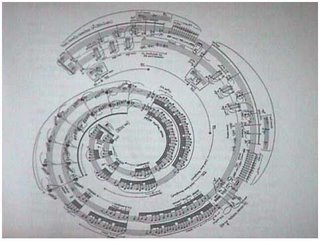 At this point, I wasn't thinking about chord progressions, but rather about mice running across my face while I slept! I could hear every little noise and creek, and said as much to my husband. He replied, "Oh no, that's just the skunk living under our trailer." Somehow this didn't comfort me. Just as I started to dowse off, the whole coyote family and their friends decided to come out with a rising chorus of howls at our gate, and of course the train went by with it's horn blasting away. I thought to myself, "John Cage may call this music." Mice squeaking, skunks scratching, coyotes howling and trains bellowing makes for a great aleatoric modern composition.
At this point, I wasn't thinking about chord progressions, but rather about mice running across my face while I slept! I could hear every little noise and creek, and said as much to my husband. He replied, "Oh no, that's just the skunk living under our trailer." Somehow this didn't comfort me. Just as I started to dowse off, the whole coyote family and their friends decided to come out with a rising chorus of howls at our gate, and of course the train went by with it's horn blasting away. I thought to myself, "John Cage may call this music." Mice squeaking, skunks scratching, coyotes howling and trains bellowing makes for a great aleatoric modern composition.
On a more optimistic note, I was refreshed this morning at church. Unfortunately, our pastor is ill, and so we were informed that we would hear a sermon on CD. This is when it is a blessing to be married to a preacher. The chairman announced, "As providence would have it, we have a preacher with a sermon in the back pocket of his wranglers."
Clint preached the best sermon that I think he's ever preached (although I do seem to say that after every sermon.) He preached the same one in Edmonton (from 1 Peter 2) the week before and you can find it online here.
During these three weeks we also made a few trips to Edmonton where Clint preached at Grace Reformed Baptist Church of Edmonton and I learned how to make apple pie from my Grandmother (who is known for making amazing pies.)
The night before my first exam I had what may have been a refining moment from the Lord or else it was a cruel jest from the devil. I was wound up in a knot with all these facts, dates and chord progressions running through my head, when all of the sudden I heard noises coming from the other room. I woke Clint up in a hurry and he eventually got up to check (being the wonderful husband that he is). Of course it was mice running around and having a grand old time in my kitchen. We closed the bedroom door, but they could still have easy access to our bedroom through the pipelines.
 At this point, I wasn't thinking about chord progressions, but rather about mice running across my face while I slept! I could hear every little noise and creek, and said as much to my husband. He replied, "Oh no, that's just the skunk living under our trailer." Somehow this didn't comfort me. Just as I started to dowse off, the whole coyote family and their friends decided to come out with a rising chorus of howls at our gate, and of course the train went by with it's horn blasting away. I thought to myself, "John Cage may call this music." Mice squeaking, skunks scratching, coyotes howling and trains bellowing makes for a great aleatoric modern composition.
At this point, I wasn't thinking about chord progressions, but rather about mice running across my face while I slept! I could hear every little noise and creek, and said as much to my husband. He replied, "Oh no, that's just the skunk living under our trailer." Somehow this didn't comfort me. Just as I started to dowse off, the whole coyote family and their friends decided to come out with a rising chorus of howls at our gate, and of course the train went by with it's horn blasting away. I thought to myself, "John Cage may call this music." Mice squeaking, skunks scratching, coyotes howling and trains bellowing makes for a great aleatoric modern composition.On a more optimistic note, I was refreshed this morning at church. Unfortunately, our pastor is ill, and so we were informed that we would hear a sermon on CD. This is when it is a blessing to be married to a preacher. The chairman announced, "As providence would have it, we have a preacher with a sermon in the back pocket of his wranglers."
Clint preached the best sermon that I think he's ever preached (although I do seem to say that after every sermon.) He preached the same one in Edmonton (from 1 Peter 2) the week before and you can find it online here.
12 August 2006
Young Men Leaving, Old Men Passing On
With the passing on to glory of my former teacher and colleague, Dr. Geoff Adams, and the departure of my two brothers-in-law to school in Virginia, it feels a bit strange to be sitting here in rural Alberta, my temporary destination.
But as the sorrow of a fruitful ministry gone begins to settle, the hope of new ventures arises.
I pray that the myopia that plagues us all would be crushed by the weight of glory to be revealed as God manifests his saving, reviving power.
As Christians we look to the future, though anchored in the past. Who knows what God may do through young men going off to school, young women handing on the faith to a new generation, and not-so-young folks striving to finish well.
Lord, grant us all the quickening of your Spirit!
But as the sorrow of a fruitful ministry gone begins to settle, the hope of new ventures arises.
I pray that the myopia that plagues us all would be crushed by the weight of glory to be revealed as God manifests his saving, reviving power.
As Christians we look to the future, though anchored in the past. Who knows what God may do through young men going off to school, young women handing on the faith to a new generation, and not-so-young folks striving to finish well.
Lord, grant us all the quickening of your Spirit!
11 August 2006
More Tracks from the Chariot
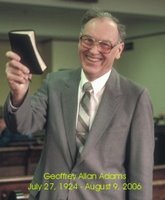
Here are reflections on the godly Dr. Geoff Adams:
- Ian: Dr. Geoff Adams
- Paul: Dr. Geoff Adams Has Gone to Glory
- Christian: Gone Home
10 August 2006
Geoff Adams: The Chariot of Israel Ascends
In the darkness of our day and the faltering fortunes of God's people, one could easily despair at the departure of the chariot of Israel with a latter-day Elijah(2 Kings 2:12). But God has not left us without hope or enabling. Even as Dr. Geoff Adams has passed into the presence of his Lord Christ, the material legacy of God's work though this man remains.
Simply put---Dr. Adams was a godly man. His prayers were marked by the vocabulary of the Scriptures and the grammar of heaven. To be in his presence as he approached the throne of grace was to enjoy illumination of the things of God and breathings of the Spirit of God. Such communion with God naturally overflowed from Dr. Adams in his gushing enthusiasm for the advance of Christ's kingdom.
No one admitted to Dr. Adams' classes or company would fail to be impressed with his deep appreciation and regard for the Holy Scriptures. Like a mariner sorting through knots and hitches, he relished untying and re-tying the cords of redemptive-history in order to come to grips with the cohesion and strength of the whole. Though his seamanship ended with his stint in the British Navy, his fascination with God's progressive revelation never did.
The predominant ministry which Geoff Adams engaged in was the training of pastors at Toronto Baptist Seminary. The academic rigor which he demanded reflected directly his view of the high calling of the pastor. Though challenging and tough, he did not treat students inflexibly. In this he bore the imprint of Christ-likeness far more than even his students gave him credit for.
The departure of Geoff Adams from this world to the next signals the end of an age. The world of today is much different than that of post-WWII Toronto. And yet the call of God upon the lives of men remains the same. How may those who are left behind respond to such a call? The ancient example gives us the answer. Just as Elijah was taken upon the chariot of Israel, so too we must be like Elisha with prayers for a double portion of Elijah's blessing (2 Kings 2:9). Although our request may also be a hard thing (v.10), let us not neglect to pray it and take up the mantle left behind by God's servant(v.14). In such a manner, the legacy of Dr. Geoff Adams will continue to flourish even though his chariot has breached the skies.
Simply put---Dr. Adams was a godly man. His prayers were marked by the vocabulary of the Scriptures and the grammar of heaven. To be in his presence as he approached the throne of grace was to enjoy illumination of the things of God and breathings of the Spirit of God. Such communion with God naturally overflowed from Dr. Adams in his gushing enthusiasm for the advance of Christ's kingdom.
No one admitted to Dr. Adams' classes or company would fail to be impressed with his deep appreciation and regard for the Holy Scriptures. Like a mariner sorting through knots and hitches, he relished untying and re-tying the cords of redemptive-history in order to come to grips with the cohesion and strength of the whole. Though his seamanship ended with his stint in the British Navy, his fascination with God's progressive revelation never did.
The predominant ministry which Geoff Adams engaged in was the training of pastors at Toronto Baptist Seminary. The academic rigor which he demanded reflected directly his view of the high calling of the pastor. Though challenging and tough, he did not treat students inflexibly. In this he bore the imprint of Christ-likeness far more than even his students gave him credit for.
The departure of Geoff Adams from this world to the next signals the end of an age. The world of today is much different than that of post-WWII Toronto. And yet the call of God upon the lives of men remains the same. How may those who are left behind respond to such a call? The ancient example gives us the answer. Just as Elijah was taken upon the chariot of Israel, so too we must be like Elisha with prayers for a double portion of Elijah's blessing (2 Kings 2:9). Although our request may also be a hard thing (v.10), let us not neglect to pray it and take up the mantle left behind by God's servant(v.14). In such a manner, the legacy of Dr. Geoff Adams will continue to flourish even though his chariot has breached the skies.
Financial Fallout
Consider the financial fallout of the mega-church movement. Is there not an abundance of money demanded and supplied for mega-churches that smaller churches never see?
It seems to me that a new deliberateness is required by Reformed evangelicals to fund church plants, mentorships, and theological education. Already, young Christians and young church plants have a difficult time finding the resources to help them in kingdom work.
By contrast, the mega-churches with the money will become more clearly allied with the bible colleges, seminaries and even mission agencies who adopt a similar 'lowest common denominator' approach. There is money there, but it has strings attached.
Those who have convictions may find they are marginalized both theologically and financially.
It seems to me that a new deliberateness is required by Reformed evangelicals to fund church plants, mentorships, and theological education. Already, young Christians and young church plants have a difficult time finding the resources to help them in kingdom work.
By contrast, the mega-churches with the money will become more clearly allied with the bible colleges, seminaries and even mission agencies who adopt a similar 'lowest common denominator' approach. There is money there, but it has strings attached.
Those who have convictions may find they are marginalized both theologically and financially.
09 August 2006
The Other Typology

Paul writes to Timothy exhorting him to preach and teach the doctrine that Paul had passed on to him.
He also wished that Timothy would aspire to a such a character as to silence any who would despise his youth (1 Tim 4:12).
In contrast to being despised for immaturity, Paul commanded Timothy to be a "type of the faithful ones" or a "type of the believing ones".
In this way there is an alternative typology for the Christian to study---the typology of a godly life.
08 August 2006
Conferences & the Local Church
How important is it for pastors to attend the mega conferences like Shepherds Conference, Bethlehem Pastor's Conference, Together for the Gospel, and a host of others (Banner of Truth, Bunyan, Philadelphia Reformed, etc.)?
The positives are that pastors enjoy fellowship and encouragement from other pastors and speakers. There are lots of new book acquisitions, too. For the most part, these conferences are generally viewed as 'all-positive', and the more you can attend the better.
However, the negatives are important as well. For example, the celebrity orientation that conferences can have makes a pastor tempted to get into an 'inner circle' or feel slighted to be left out. Unhealthy desires for duplication of speakers' ministries can lead men of lesser gifts and different situations to develop artificial approaches, goals and standards.
Are there any options for adjustment if adjustment is needed in our view of conference-going? Would smaller, more regional conferences be better? Are the mega-conferences important to the cohesion of the reformational sector of Evangelicalism, and should thereby be supported in earnest? Do the mega-conferences and their speakers end up being a default Episcopate and confederation of Cardinals? Maybe this is inescapable and practically helpful.
One last thought---do the mega-conferences serve as a sort of go-between for the local church and the seminaries? By this I mean, are conferences the place where current issues are addressed or teaching is expounded that is accessible to the local church in a way that seminaries don't provide.
Has the rise of mega-conferences come from the lack of church-based theological education?
And finally, if I go to a conference this year, which one should it be and why?
The positives are that pastors enjoy fellowship and encouragement from other pastors and speakers. There are lots of new book acquisitions, too. For the most part, these conferences are generally viewed as 'all-positive', and the more you can attend the better.
However, the negatives are important as well. For example, the celebrity orientation that conferences can have makes a pastor tempted to get into an 'inner circle' or feel slighted to be left out. Unhealthy desires for duplication of speakers' ministries can lead men of lesser gifts and different situations to develop artificial approaches, goals and standards.
Are there any options for adjustment if adjustment is needed in our view of conference-going? Would smaller, more regional conferences be better? Are the mega-conferences important to the cohesion of the reformational sector of Evangelicalism, and should thereby be supported in earnest? Do the mega-conferences and their speakers end up being a default Episcopate and confederation of Cardinals? Maybe this is inescapable and practically helpful.
One last thought---do the mega-conferences serve as a sort of go-between for the local church and the seminaries? By this I mean, are conferences the place where current issues are addressed or teaching is expounded that is accessible to the local church in a way that seminaries don't provide.
Has the rise of mega-conferences come from the lack of church-based theological education?
And finally, if I go to a conference this year, which one should it be and why?
04 August 2006
A Novel Suggestion

If you want to read a novel that is educational, entertaining, and that may make you feel a little more cultured, try reading Evening in the Palace of Reason: Bach Meets Frederick the Great in the Age of Enlightenment.
The author, James R Gaines, has a way of bringing to life the tension between Johann Sebastian Bach's morals, beliefs and practices and the incoming 'age of enlightenment,' as typified by Frederick the Great, Prussia's young king.
The following excerpt from the first chapter exemplifies the tension that begins to unravel between these differing worldviews:
One Sunday evening in the spring of his seventh year as king, as his musicians were gathering for the evening concert, a courtier brought Frederick his usual list of arrivals at the town gate. As he looked down the list of names, he gave a start.
"Gentlemen, " he said, '"old Bach is here." Those who heard him said there was " a kind of agitation" in his voice. (p.5)...
Nowhere were they more different, though, than in their attitudes toward music. Bach represents the "learned counterpoint" of canon and fugue, a centuries-old craft that by now had developed such esoteric theories and procedures that some of its practitioners saw themselves as the custodians of a quasi-divine art, even as weavers of the cosmic tapestry itself. Frederick and his generation were having none of that. They denigrated counterpoint as the vestige of an outworn aesthetic, extolling instead the "natural and delightful" in music, by which they meant the easier pleasure of song, the harmonic ornamentation of a single line of melody. For Bach this new, so-called galant style, with all its lovely figures and stylish grace, was full of emptiness. Bach's cosmos was one in which the planets themselves played the ultimate harmony, a tenet that had been unquestioned since the "sacred science" of Pythagoras; composing and performing music was for him and his musical ancestors a deeply spiritual enterprise whose sole purpose, as his works were inscribed, was "for the glory of God." For Frederick the goal of music was simply to be "agreeable," and entertainment and a diversion, easy work for performer and audience alike. He despised music that, as he put it, "smells of the church" and called Bach's chorales specifically "dumb stuff." Cosmic notions like the "music of the spheres" were for him so much dark-age mumbo jumbo. (p.7-8)
03 August 2006
Aberdeen Phd--- An Update
I just sent out an update letter regarding our plans for PhD study in the UK.
As many of you know, I applied, and was accepted to the MPhil/PhD program of King's College, University of Aberdeen, Scotland.
My research area would be New Testament with a specific focus on Union with Christ in the Theology of Paul. My main supervisor would be Simon Gathercole.
As many of you know, I applied, and was accepted to the MPhil/PhD program of King's College, University of Aberdeen, Scotland.

My research area would be New Testament with a specific focus on Union with Christ in the Theology of Paul. My main supervisor would be Simon Gathercole.
Unfortunately however, we don't have sufficient funds to warrant going this fall. This has been quite disappointing for me.
However we are trying to look for God's intentions for us if we stay in Alberta for a year--working and raising support.
In all of this the challenge for me is to hold even my good ambitions with a loose hand, and to trust God for provision and procedures.
We covet your prayers as we look forward to God's unfolding intent.
01 August 2006
A Busy Weekend


How is it that my husband looks like the Marlborough Man (minus the cigarette) in his cowboy gear, whereas I end up looking more like Calamity Jane?!
Clint and I had a busy weekend moving cattle on our pasture land north of Calgary. I learned to drive the horse trailer and am proud to say I put no dent in the trailer (only a nick.)
Following this adventure, we had the pleasure of visiting Grace Reformed Baptist Church of Edmonton where Clint preached an excellent sermon (I'm a little biased) on the 'Antiochean Reformation.' You can listen to it here.
On Reading
Learning to read literature will be an invaluable tool for reading the Bible. Learning to read well--that is, learning to listen to a text and notice the way in which its form contributes to its meaning---is necessary to good Bible reading. Reading is more than learning the alphabet and vocabulary. Good reading is understanding what an author is expressing. Christians must be good readers if they really want to understand the Bible.
~ W. Robert Godfrey in Why Read Fiction?,
Evangelium (Westminster Seminary California)Vol4, Issue3.
Evangelium (Westminster Seminary California)Vol4, Issue3.
Subscribe to Posts [Atom]
